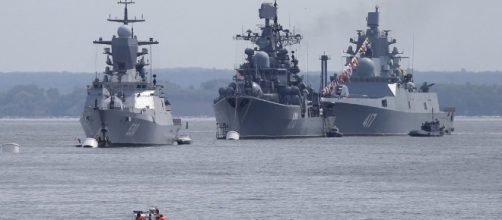The Russian military announced, early Saturday, approximately 36 hours after the American strike in Syria last week, that it was diverting one of its own warships from the Black Sea, to the Mediterranean.
According to Russia's state-owned new agency, Sputnik, the missile-armed warship will operate in the Mediterranean Sea along with six other Russian ships and three or four support vessels. Russia said the ships are prepared to deal with changing United States military activity.
Russia patrols increase
Although Moscow's army is smaller now than during the cold war, Russia's navy has increased patrols in the Mediterranean, north Atlantic, and Arctic regions and has also stepped up submarine deployments in those regions.
U.S. Navy Admiral Michelle Howard, NATO's Allied Joint Force Commander in Naples, and who commands U.S. naval forces in Europe and Africa, said American warships that sailed into Mediterranean waters during the Syrian attack, last week, had never experienced that type of Russian activity since the Soviet Era.
Deterioration in US-Russian relations
The increased presence of warships in the Mediterranean coincides wth cyber attacks, dangerous fly-bys of U.S. and allied ships, and the rapid deterioration in US-Russian relations.
Speaking to Reuters during an interview late Saturday, Howard said that the activity we are now seeing wasn't even experienced when it was the Soviet Union. She went on to say that NATO members might start to focus on the areas close to them rather keeping their focus on Russian activity in other regions – which might leave their allies exposed to possible dangers.
When Russia moves forces around they end up splitting and distracting the view of the alliance, she told the news agency.
Activity not seen since the Cold War
The build-up of NATO forces, to levels not seen since the Cold War, in Poland and the Baltic states is cause for great concern. Russian spy ships in U.S. waters, like the ship spotted this February near the coast of Delaware, and that same week, the USS Porter was buzzed by four Russian planes while stationed in the Black Sea.
NATO's allies are worried about impending threats from Russia, but U.S. President Donald Trump has said he would not protect NATO members from the threat of Russian forces, who sees the build-up of NATO forces as a provocation unless they were able to meet suggested spending targets.
The Admiral Grigorovich, a Russian warship that was part of a group of vessels led by Moscow's only aircraft carrier, the Admiral Kuznetsov, bombed Syrian rebels from the Mediterranean last year.

